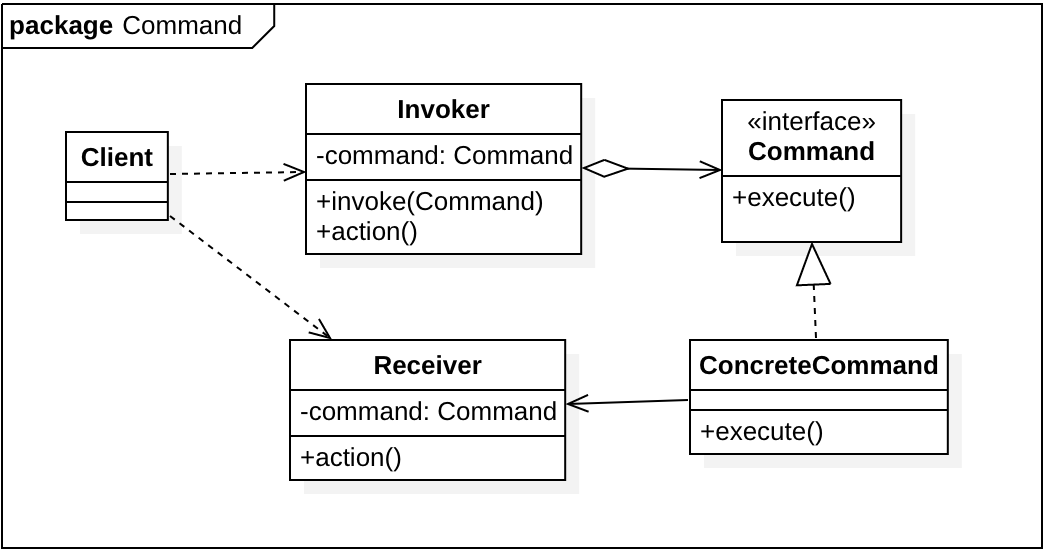命令模式(Command)
1. 定义及使用场景¶
将一个请求封装成一个对象,从而让用户使用不同的请求把客户端参数化;对请求排队或者记录请求日志,以及支持可撤销的操作
使用场景
- 需要抽象出待执行的行动,然后以参数的形式提供出来——类似于过程设计中的回调机制,而命令模式正是回调机制的一个面向对象的代替品。
- 在不同的时刻指定、排列和执行请求,一个命令对象可以有与初始请求无关的生存期
- 需要支持取消操作
- 支持修改日志功能,这样当系统崩溃时,这些修改可以被重做一遍
- 需要支持事务操作
2. UML图¶

- Receiver
接受者。负责具体实施或执行一个请求 - Command
命令角色。定义所有具体命令的抽象接口 - ConcreteCommand
具体命令。在execute方法中调用接收者角色的相关方法,在接受者和命令执行的具体行为之间加以弱耦合 - Invoker
请求者。调用命令对象执行具体的方法 - Client
客户端
3. 举个例子¶
下面这个例子中,我们用一个开关控制开灯、关灯两个命令。
/** The Command interface */
interface Command {
fun execute()
}
/** The Invoker class */
class Switch {
private val history = mutableListOf<Command>()
fun storeAndExecute(cmd: Command) {
history.add(cmd)
cmd.execute()
}
}
/** The Command for turning on the light - ConcreteCommand #1 */
class FlipUpCommand(private val light: Light) : Command {
override fun execute() {
light.turnOn()
}
}
/** The Command for turning off the light - ConcreteCommand #2 */
class FlipDownCommand(private val light: Light) : Command {
override fun execute() {
light.turnOff()
}
}
/** The Receiver class */
class Light {
fun turnOn() = println("The light is on")
fun turnOff() = println("The light is off")
}
fun main(args: Array<String>) {
val inputArgs = listOf("ON", "OFF", "ON", "OFF")
val light = Light()
val switchUp = FlipUpCommand(light)
val switchDown = FlipDownCommand(light)
val switch = Switch()
inputArgs.forEach {
when (it) {
"ON" -> switch.storeAndExecute(switchUp)
"OFF" -> switch.storeAndExecute(switchDown)
}
}
}
输出结果如下
4. 源码中的例子¶
PackageManagerService也是Android系统的Service之一,其主要功能在于实现对应用包的解析、管理、卸载等操作,在PackageManagerService中,其对包的相关消息处理由其内部类PackageHandler承担,其将需要处理的请求作为对象通过消息传递给相关的方法,而对于包的安装、移动以及包大小的测量则分别封装为HandlerParams的3个具体子类InstallParams、MoveParams和MeasureParams,HandlerParams的逻辑不多,主要是对3个抽象方法的声明:
private abstract class HandlerParams {
private static final int MAX_RETRIES = 4;
/**
* Number of times startCopy() has been attempted and had a non-fatal
* error.
*/
private int mRetries = 0;
/** User handle for the user requesting the information or installation. */
private final UserHandle mUser;
String traceMethod;
int traceCookie;
HandlerParams(UserHandle user) {
mUser = user;
}
UserHandle getUser() {
return mUser;
}
HandlerParams setTraceMethod(String traceMethod) {
this.traceMethod = traceMethod;
return this;
}
HandlerParams setTraceCookie(int traceCookie) {
this.traceCookie = traceCookie;
return this;
}
final boolean startCopy() {
boolean res;
try {
if (DEBUG_INSTALL) Slog.i(TAG, "startCopy " + mUser + ": " + this);
if (++mRetries > MAX_RETRIES) {
Slog.w(TAG, "Failed to invoke remote methods on default container service. Giving up");
mHandler.sendEmptyMessage(MCS_GIVE_UP);
handleServiceError();
return false;
} else {
handleStartCopy();
res = true;
}
} catch (RemoteException e) {
if (DEBUG_INSTALL) Slog.i(TAG, "Posting install MCS_RECONNECT");
mHandler.sendEmptyMessage(MCS_RECONNECT);
res = false;
}
handleReturnCode();
return res;
}
final void serviceError() {
if (DEBUG_INSTALL) Slog.i(TAG, "serviceError");
handleServiceError();
handleReturnCode();
}
abstract void handleStartCopy() throws RemoteException;
abstract void handleServiceError();
abstract void handleReturnCode();
}
这里结合命令模式来看,HandlerParams也是一个抽象命令者,而对于其3个子类则对应于各个功能不同的具体命令角色,请求者依然可以看作是由PackageManagerService承担的。